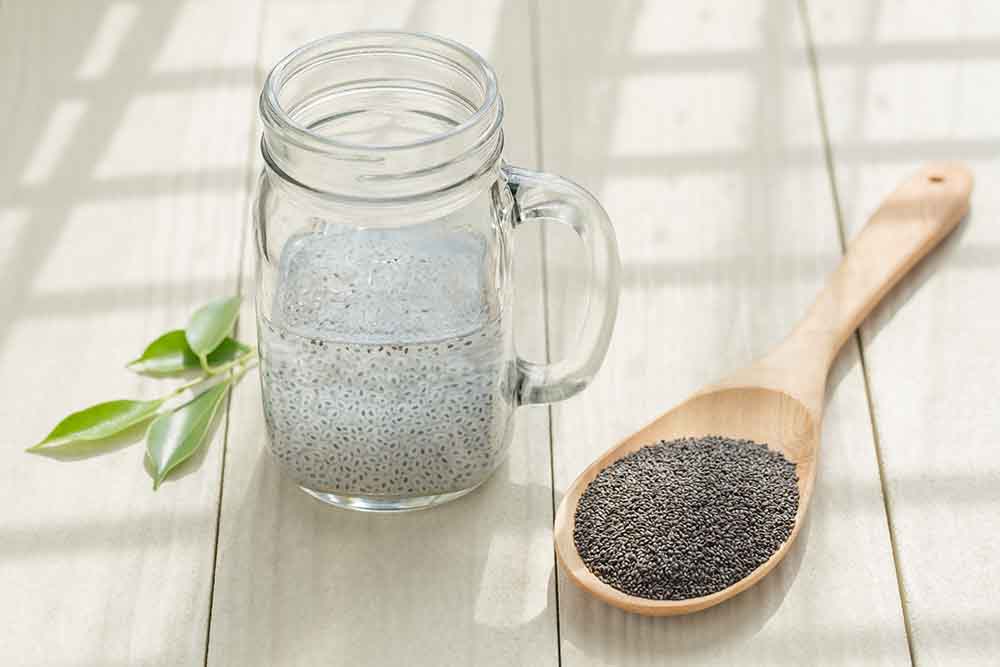Sabja seeds have recently become very popular in many places. They are being used to add a subtle, cool and refreshing flavour to salads, soups, and stews.
Sabja seeds are often added to dals in India. Sabja seeds are extensively cultivated in countries such as Afghanistan and Pakistan.
In Europe and North America, the plant is grown majorly for its beautiful bluish-coloured flowers. The flowers of sabja seeds are also used to make sweet jellies.
The Nutritional Value of Sabja Seeds
Sabja seeds are rich in protein. A 100g of sabja seeds will provide approximately 11.8 g of protein.
The chemical composition of the seeds contains an appreciable amount of minerals such as phosphorus, potassium, magnesium, iron and manganese. Other vitamins that are present in high amounts include niacin, vitamin B6 and riboflavin.
Sabja seeds contain good quantities of oil that include fatty acids such as linoleic acid and oleic acid. It also contains quite a lot of calcium and potassium per 100g (roughly).
Sabja Seed Benefits
Sabja benefits are long and varied. Some of these benefits are as follows:
Reducing Cholesterol & Triglycerides:
The cholesterol-reducing and triglyceride-reducing properties of sabja seeds have been attributed to their niacin, vitamin B6, riboflavin and fibre content. The ability of the seeds to lower bad cholesterol levels significantly has also been documented in several studies.

Periodontal Disease Prevention:
A study that was carried out in India proved that sabja seeds have significant anti-inflammatory properties. Anti-inflammatory herbs are known for their ability to prevent periodontal disease.
Reducing Stress:
Sabja seeds contain several enzymes such as superoxide dismutase, which is a potent antioxidant enzyme. Antioxidants are believed to play a vital role in slowing down the effects of ageing by neutralising free radicals. It is also believed that sabja seeds can assist the body in dealing with physical and mental stress, thus reducing stress-related conditions including hypertension, heart disease, depression and anxiety.
Aids in Weight Loss:
Sabja seeds are known to aid in weight loss by reducing insulin resistance. Sabja seed benefits are innumerable. It is also said that sabja seeds are effective in burning calories by increasing the body's metabolism.
Natural Body Coolant:
Sabja seed benefits the human body by also working as a natural coolant. Therefore, it can be used to soothe discomforting livers, stomach and intestines. It is believed that the cooling effect of sabja seeds is due to their content of vitamin B2 and calcium. You can use sabja benefits by adding them to salads or vegetable dishes or by drinking a glass of sabja seed tea.
Relieves Constipation and Acidity:
Sabja seeds are believed to have a detoxifying characteristic. Therefore, it is considered to be one of the best sabja seed benefits that can aid in easing the body from toxic elements. It is also quite effective in treating acidity and constipation.
Aids Heart Health:
Sabja seeds contain anti-inflammatory properties that can aid in treating problems related to heart health such as swelling and high blood pressure. They are also believed to lower bad cholesterol levels, thus reducing the risk of heart disease.
Help Soothe Pain:
Sabja benefits the human body like an analgesic. The pain-relieving quality of sabja seeds is due to their contents in vitamin C, B6 and niacin. The inflammation-fighting properties of sabja seeds are boosted by their content of calcium and other minerals. Therefore, they offer pain relief that is quite effective.
Helps Cure Jaundice:
Sabja seeds are also believed to have a detoxifying property and be effective when it comes to curing yellowing of the eyes, skin and mucous membranes.
Other Benefits of Sabja Seeds
Acts as a Blood Cleaner:
The anti-inflammatory and antibiotic-like properties of Sabja seeds make them an ideal remedy for boils, swelling and skin ailments such as cold sores.
Cooking Spices:
Sabja seeds are commonly used as a garnish for dals, farsan (Indian savoury) dishes, chutneys and salads in India and Pakistan. They are also used to make pickles, jams, jellies and teas.
Blood Pressure Control:
Sabja seeds can lower blood pressure in people with prehypertension or mild hypertension. It is believed that sabja's ability to lower blood pressure is due to its high potassium content.
Analgesic:
Sabja seeds have analgesic properties that are attributed to the niacin present in them. They can be used to relieve headaches, toothache, muscle pain and fever.
Reduces Sugar Levels:
Sabja seeds benefits in reducing high sugar levels are due to their content in chromium. Chromium supplements are often used to reduce sugar levels in diabetic people.
Cures Skin Conditions:
The anti-inflammatory properties of sabja seeds can be utilised to cure skin conditions such as acne and eczema.
Conclusion
Sabja seeds are a part of Indian cuisine and they have been beneficial to humans for thousands of years. These small seeds offer a wide variety of health benefits. In addition, they can be used medicinally, as food or as an everyday spice.
Sabja seeds provide relief from acidity and heartburn. The oil present in sabja seeds is known for naturally treating this problem. Another benefit of the oil is that it helps in clearing up your throat and sinuses and relieves you of a stuffy nose.
Sabja seeds are also good for the lungs because they are thought to have anti-asthmatic properties. A few teaspoons of the seeds taken with warm water, at bedtime, are said to be very helpful to people who suffer from asthma attacks frequently.
FAQs
What are Sabja Seed Benefits?
Sabja seed benefits health by preventing cancer, aiding weight loss, aiding heart health and more.
Can Sabja Seeds be used therapeutically or as a medicine?
Yes, Sabja seeds benefits can be employed therapeutically but it depends on the individual. They are used in many medicines like antibiotics, anti-inflammatories, painkillers and so on. Many people also eat them to gain numerous health benefits because sabja benefits them medicinally.